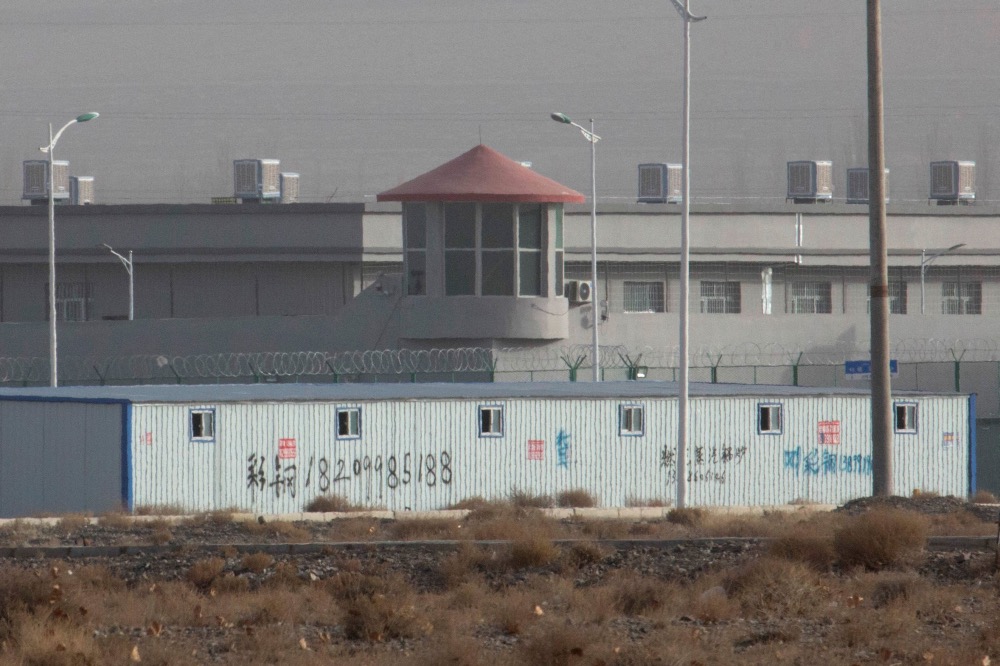On his final day in office, then President Donald Trump and his administration declared China’s treatment of its Uighur population a genocide. So far, President Joe Biden has taken the United States in a different direction from his predecessor on almost every issue at hand, but on this question Biden’s foreign policy team has not backed down.
“My judgment remains that genocide was committed against the Uighurs, and that hasn’t changed,” said Secretary of State Antony Blinken shortly after taking office.

In this Monday, 3rd December, 2018, file photo, a guard tower and barbed wire fences are seen around a facility in the Kunshan Industrial Park in Artux in western China’s Xinjiang region. PICTURE: AP Photo/Ng Han Guan/File photo.
Then-Secretary of State Mike Pompeo’s 19th January statement outlined reasons for the designation, including the imprisonment of a million people, the use of sterilisations and abortion as state policy and forced marriages with members of the ethnic Han Chinese majority. Uighurs have been relocated to work camps far away from their homes in Xinjiang Province.
Pompeo’s declaration was applauded by human rights groups and earned the Trump administration rare praise from Muslim American groups.
For its part, China strongly condemned the designation and dismissed the criticism of its treatment of the Uighurs.
“China has no genocide, China has no genocide, China has no genocide, period,” Chinese Foreign Ministry spokesman Zhao Lijian told reporters in response to Blinken’s comments in late January.
In the close scorecard-keeping of Washington politics, some Republican commentators point out that Biden has not used the term genocide himself since taking office and that he soft-pedalled the issue in a call with Chinese President Xi Jinping last month, despite raising the issue. Some State Department legal experts, they note, have reportedly disagreed with the designation on technical grounds.
But advocates for the Uighurs say they expect the Biden administration to proceed on the understanding that China’s actions amount to genocide.
“We have a lot of hope that the administration will treat this not just as a human rights issue but as an active genocide,” said Rushan Abbas, executive director of the Campaign for Uighurs. “With any administration change, there is an adjustment period, but, on this issue, we expect to see continuity.”
Abbas pointed out that Biden had labeled the treatment of the Uighurs and related minority groups a genocide on the campaign trail, marking the growing concern from the American public about Chinese human rights violations. Recent polls have also shown bipartisan support among Americans for US sanctions to pressure China.
What’s not clear is just how Biden plans to pressure Beijing.
“The Biden administration has maintained the genocide designation and the [Trump administration’s] sanctions on products produced by Uighur forced labour,” says Tahir Imin, a Uighur activist, “but we haven’t seen concrete new steps to address the crisis from the new administration so far.”
If the genocide designation has become a political football in Washington, the question is not a semantic one for Uighurs such as Imin, who saw first hand Beijing’s system of concentration camps as a political prisoner. He spent nearly two years in prison for his activism in a Uighur culture facing torture, labour and other hardships. A ten-month portion of his imprisonment took place at an intensive labor re-education camp, where food was scarce and Communist indoctrination was constant.
And new details of how dire the Uighurs’ situation is continue to emerge. Last month the BBC reported the systematic rape and other forms of sexual assault perpetrated on Uighur women.
“I couldn’t sleep at night after reading that report,” said Abbas, whose sister was abducted in Xinjiang two and half years ago and is believed to be held in a Chinese concentration camp. “How can Western institutions do business with a regime that takes a medical doctor and turns her into a textile worker and into a slave?” she asked.
Correction: Antony Blinken’s name has been corrected.






